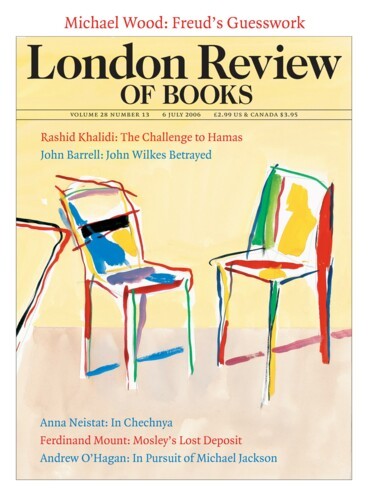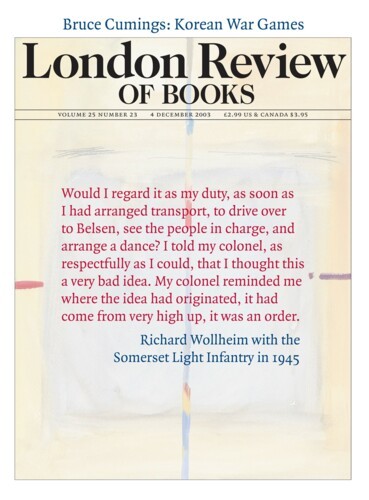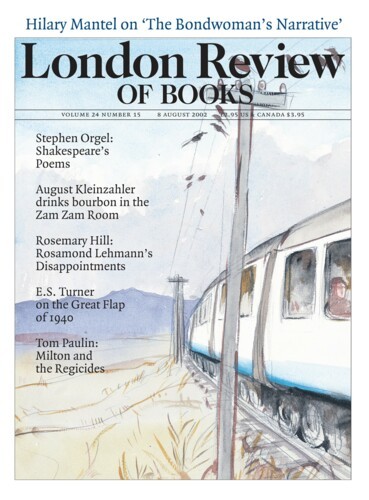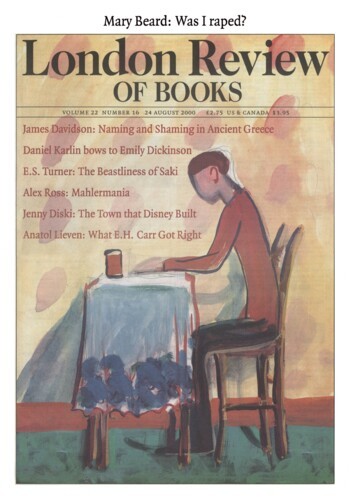Tony Wood
Tony Wood teaches history at the University of Colorado Boulder. Russia without Putin: Money, Power and the Myths of the New Cold War was published by Verso in 2018.
Raskolnikov into Pnin: Betraying the People’s Will in Tsarist Russia
Tony Wood, 4 December 2003
The first ‘wanted’ poster to be issued in Russia appeared in late February 1884, and featured six likenesses of the suspect: three frontal shots, showing a man in his late twenties, with a moustache, with a beard and clean-shaven; and, beneath them, a trio of three-quarter views of the same man, repeating the permutations of facial hair, but with a fur hat added to each image. The...
In Moscow: In Moscow
Tony Wood, 8 August 2002
As you come into Moscow from Sheremetevo airport, the way is guarded by a monument marking the limit of the German advance in October 1941: red girders protrude from a sloping plinth, forming a line of three skewed crosses, replicating in miniature the anti-tank defences that once stood here. Then, this would have been an open field: now the monument doubles as the gate to Khimki – more...
I’m with the Imaginists: the memoirs of an early Soviet poet
Tony Wood, 7 March 2002
On 28 May 1919, the residents of Moscow woke to find that the walls of the Strastnoi convent had been daubed with what at first glance might have appeared to be crude blasphemous slogans. More attentive reading, however, revealed that this was poetry: ‘I sing and appeal: Lord, give birth to a calf!’ ‘Look at the fat thighs/Of this obscene wall./Here the nuns at night/Remove...
Nation of Mutes: Marquis de Custine
Tony Wood, 24 August 2000
The Marquis de Custine is best known for La Russie en 1839, an eloquent account of his travels across European Russia and of the horrors and absurdities of the Russian autocracy. Born in 1790, Custine lost his grandfather at the age of three and, a year later, his father: both were executed during the Jacobin Terror, although both had been sympathetic to the Revolution. Indeed, his grandfather, General Adam-Philippe de Custine, had been a supporter of the American War of Independence and in 1793, as one of the few French aristocrats in favour of revolution, was appointed commander-in-chief of the Army of the North. He was tried for failing to prevent the surrender of the besieged Cond, while Custine’s father was tried for printing and distributing a defence of the General. Custine himself had a quieter life. He grew up on the family estate at Fervaques in Normandy, and travelled in Italy, Switzerland and Germany as an adolescent. He had a brief career in diplomacy, working in an undefined role under Talleyrand at the Congress of Vienna in 1815, but returned to Fervaques in 1816.
Podcasts & Videos
Tony Wood and James Meek: Russia without Putin
James Meek and Tony Wood
Tony Wood talks to James Meek about his book Russia with Putin, which looks at, among other things, the legacy of Soviet infrastructure and the extent of political opposition in today’s Russia.
Read anywhere with the London Review of Books app, available now from the App Store for Apple devices, Google Play for Android devices and Amazon for your Kindle Fire.
Sign up to our newsletter
For highlights from the latest issue, our archive and the blog, as well as news, events and exclusive promotions.





